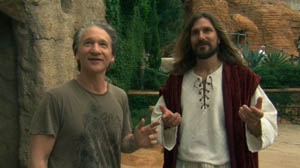|
Bill Maher went and made a movie just for me! What a nice guy; after all, I don't even know him.  Religulous is an oft-hilarious exploration of the mindset of the religious and the history of religion in the world. To say that it will divide viewers is an understatement, so I'll be a little more specific: it will likely divide viewers into two very unevenly-weighted camps, those being the non-religious, who will find it to be a breath of fresh air, and the tiny number of religious people who will become very irate. Tiny, not because of their status as a social minority in Amercia, which is overwhelmingly not the case, but tiny because very few of them will probably ever go to see this film in the first place. Comedian Bill Maher's stated aim with this film is "to try and understand, not make fun," of religious views. His curiosity is unquestionable, but his assertion that fun isn't being made isn't entirely truthful. Sometimes he makes fun in the interviews themselves, sometimes he does it editorially (for example, cutting from comments about passionate love for God to footage of a suicide bombing, to both humourous and unsettling effect). But honestly, how can he help it when he's given such good ammunition? How can one not take a potshot when a US Senator tells him, in explanation of the rampant religious belief present in American government, that "you don't need to pass a IQ test to be a member of the Senate," a deflection that does neither his profession or his faith any credit? Maher's journey takes him from tiny chapels at truck stops to the "Genesis Museum" to the Dome of the Rock and the Vatican. Along the way, he steps on a lot of toes, but let's be quite frank: how hard is that, really? Raising any kinds of questions about religious belief is taken quite humourlessly by most people. Why? Why is this subject any different from any other? We allow (and even televise) political debate, which is often harsh and cutthroat, but no one would dream of staging a public debate on the relative merits of religious views, as opposed to right-vs-left punditry. Perhaps, as the late great sci-fi and satire author Douglas Adams once suggested, we've been tiptoeing around the subject for so long that we've simply gotten used to it. Well, perhaps the adherents of faith need to get used to having their claims treated the same as any other. One emergent pattern that's revealed by the interviews is the recurrent sense that religious followers are somehow special: I get to be with God after death, and you do not. I don't have to be able to explain any faith-centric beliefs or actions of mine, but your motives are open to scrutiny or speculation, or baldfaced assumption. I demand rights which I do not feel should extend to those of unlike minds. Faith=goodness, despite the historical record of atrocities committed by those of strong faith. Why is this? Maher asks and asks, but can get no one to give an answer not motivated by selfish reasons, i.e. "I must have faith, lest my god punish me," instead of "I have faith because of its obvious moral correctness." Indeed, no one seems able to say why faith is a good thing, other than to claim they were saved from, yes, Satanism, which is of course merely a different form of faith. Most intriguingly, the two interviewees most candid about the shortcomings of the Bible were both longtime priests stationed at the Vatican. Did constant, close immersion in the specifics of their religion inevitably lead them to confront its failings, or do they simply have a different idea of the role of religion than the average follower? 
In addition to Christianity, Maher examines Judaism, Scientology (all too briefly), and, most significantly in our modern world, Islam. Whatever the average Muslim may feel about his or her religion, the fact remains that it is one full of violent and aggressive tendencies that brook no dissension; much like Protestants and Catholics, they seem to find endless amounts of time to spend killing one another in dickering issues over HOW to worship their chosen deity. In the world of Islam, Maher finds more of the same old brand of "I demand these rights, but won't concede them" mentality that characterizes most faiths. With its endless obsession on the world's final end, religion is presented as the one creation of humankind capable of fulfilling such a prophecy. With such a large and vocal religion as Islam still kicking around in its adolescent angst in a world filled with ready means for destruction and a billion followers taught that violence against the "heathen" is a good and noble thing, maybe it's time to step up and proclaim that maybe, just maybe an arrogant assumption of revealed truth is not the best way to conduct ourselves in the world, and dedicate ourselves instead to understanding and knowledge rather than belief. My dogs and my cat get along peaceably under the same roof; the fuck is wrong with the Muslims and Jews that they can't even rise to the level of mutual acceptance possible for even a common house pet? Will this film convince anyone to change their minds about religion? Sadly, it's not likely. At best, fence-sitters might be impelled to fall to the side of reason. I suspect the greatest contribution that this film will make will be to give those of us who don't cleave to faith-based views of the world the feeling that we aren't so alone. But as the crowd filed out of the theater, I saw a couple of young kids who couldn't have been more than ten years old walk by, one of whom said to his father, "That was pretty good, wasn't it?" All I could think was, "Well, good." Given enough time-provided the legions of fanatics out there will permit so much time-there might be hope for us yet. -review by Matt Murray
|
|
||||||||